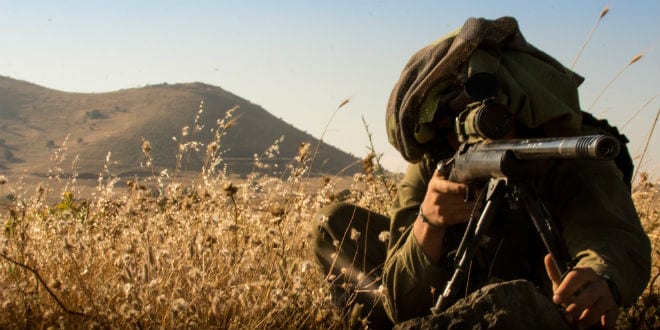The Israeli Defense Forces is preparing for a possible future which includes a nuclear-developing Iran, a senior defense source told The Jerusalem Post. According to the paper, the IDF must assume the worst to properly reshape the military, improve training and cut costs.
New IDF Chief of Staff Lt.-Gen. Gadi Eisenkot and a team of military planners spent four years developing what they have termed the “Gideon Plan” for streamlining the IDF over the next several years.
It calls for significantly increasing the power of wartime multi-arena combat divisions; restructuring the army to create specialized brigades and battalions that focus exclusively on border security, leaving the main fighting to the divisions; and improving weapons and training.
The Gideon Plan was publicized Monday, ahead of the results of the Locker Commission, which calls for significant reductions in the Israeli army’s operating budget. The Locker commission, ordered by Prime Minister Benjamin Netanyahu to examine the military budget and headed by Major General (Res.) Yohanan Locker, has received considerable criticism from defense officials, who claim it undermines the army and delegitimizes career officers.
While the Locker Commission calls for sweeping cuts to the budget, as well as to personnel, the Gideon Plan has its own recommendations for reducing waste and improving efficiency. The plan is named for the Biblical hero Gideon, who reduced his army of thousands to a mere 300 men to fight against the Midianites.
The Gideon Plan cuts the number of reservists by 100,000, eliminates four major-general positions and reduces the number of high-level administrative positions by six percent. Unlike the Locker Commission, it preserves the pensions of career officers, but limits the number of those who remain in the army long enough to be eligible for such pensions.
“To intercept [an Iranian arms smuggling ship like] the Klos C doesn’t take 20 personnel, it takes thousands of people working around the clock, including non-combat personnel. To say that only battalion commanders or air force squadrons should receive pensions is a joke,” one senior official said.
According to Eizenkot, “Harm done to those who serve causes unnecessary harm to the IDF’s ability to meet its objectives and lowers the public’s trust in the IDF. The attempt to delegitimize those who serve in the IDF is an existential threat to the military’s ability to retain professional, committed and proud employees.”
The senior official quoted by The Jerusalem Post laid out the scenarios facing the IDF in the coming years. “Iran will be a central challenge for the IDF during this time,” the official said. “It will be a mission for Military Intelligence to [continue] monitoring intelligence and [providing] alerts. The intelligence will focus on Iranian [nuclear] efforts and [the regional] influence.”
“The working assumption is that they [the Iranians] will try in the near future…to go for a basic [nuclear] capability. The assumption is that there will be an Iranian pattern of action in the covert [nuclear] channel,” he said.

Furthermore, he said, “There’s no doubt that lifting the sanctions will enable Iran to activate its influence in the region in a discernible and significant manner, more so than today.” Iranian spending on proxy terrorist states and agencies today runs $4-5 billion, a number limited only “economic limitations,” the official added.
Meanwhile, “Hezbollah is the most significant enemy in our first circle” of countries directly bordering Israel, the official explained “Hezbollah has 100,000 rockets, although it is in the most difficult crisis point since its founding. It lost 1,300 fighters in Syria, and sustained more than 5,000 injuries.”
In addition, the army is working to keep Hamas at bay, and the threat from the Islamic State in the region is growing.
The level of preparedness required by these potential threats “costs money”, according to the official. The Gideon Plan calls for a multi-year spending commitment of NIS 61-64 billion. That, along with the personnel cuts which will save billions, will mean “those who are left will be better trained, equipped, and ready for war.”
In addition to the cuts, the Gideon Plan calls for a restructuring of combat training to create two levels, one group of soldiers with a higher level of combat readiness, and another group, the majority of soldiers who would remain at the usual level of combat readiness.




